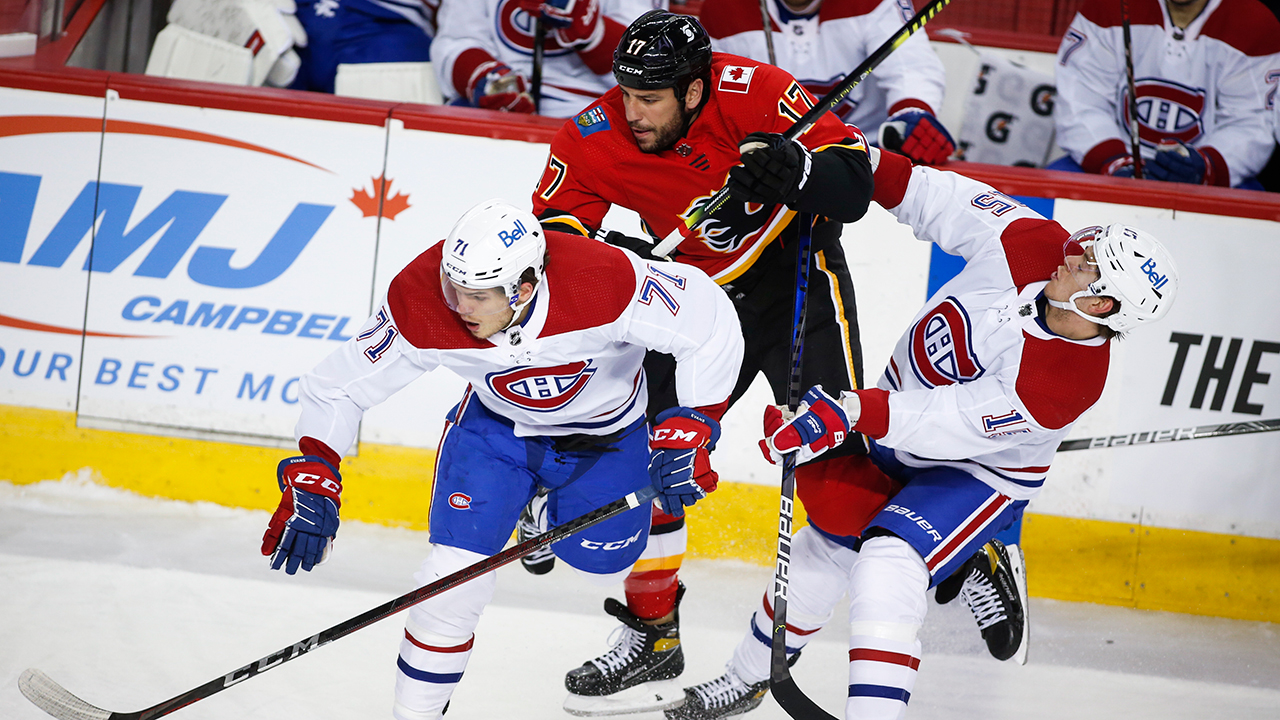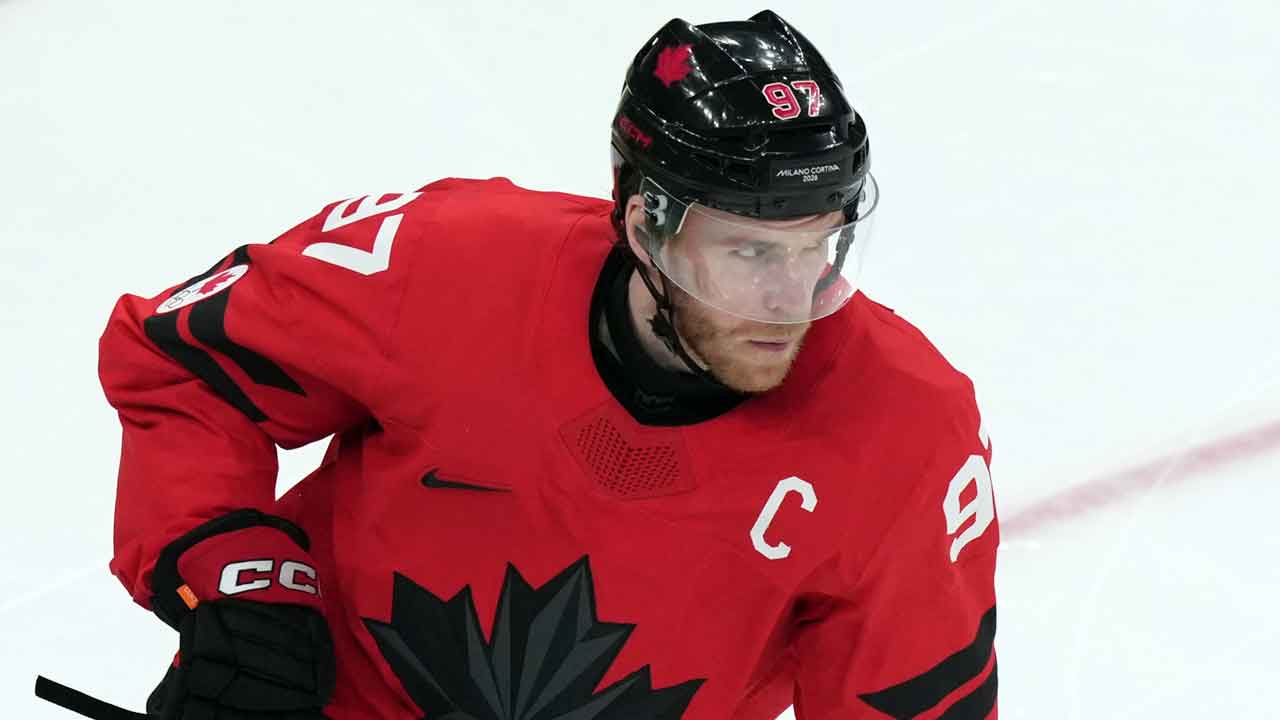
The Canadiens saw it for what it was — five games in the 13 days between themselves and a Calgary Flames team with one foot in the grave. They talked about it like a playoff series of sorts and tried to manufacture some urgency, but there’s no such thing as manufacturing urgency.
A situation is either urgent or it isn’t, and this one wasn’t. The Canadiens had arrived in Calgary with an eight-point lead in the standings and a game in hand on the Flames. They were coming off one of their best games of the season in Edmonton and a hard-fought two-game series against the Oilers.
Meanwhile, the Flames were resting at home from Tuesday until the first of three meetings against the Canadiens on Friday. It was Calgary’s season on the line, not Montreal’s, and they played like it and won.
A night later, the Canadiens certainly played like more was on the line, but they weren’t able to sustain it with a depleted lineup.
On Monday, they have to. The final game between these teams is as close to must-win as it gets for both of them, and it’s the first one where that urgency doesn’t have to be manufactured for the Canadiens. If they lose it, they only hold a two-point advantage over the Flames for the final playoff spot in the North Division, and the threat of that just might be enough to get them up to a level the Flames haven’t seen from them yet this season.
Still, walking away with a win is going to be a challenge. Even if Jonathan Drouin (sick), Paul Byron (injured) and Tomas Tatar (injured) are able to play, they’ll be doing it at sub-optimal levels, and the Canadiens are going to need some reinforcements.
Good thing Cole Caufield is right there for them. There would be no excuse for not playing him in this one. They’d have the cap space to do it by moving Cayden Primeau to the taxi squad and dressing Charlie Lindgren as the backup. They could even keep Jake Evans in and avoid using their last non-emergency call-up if two of Drouin, Byron and Tatar can’t play.
Now, if you’re looking at this situation and saying it’s too much pressure to put on a 20-year-old who’s never played in an NHL game, you’re looking at it the wrong way. Caufield has been a dominant player at every level, he earned the 2021 Hobey Baker Award by authoring one of the greatest seasons ever seen at the college level, and he thrives on this kind of pressure.
And Caufield doesn’t have to be Montreal’s saviour in this game. He doesn’t even have to score. He just needs to play his game, which is threatening whether he scores or not.
In games where the margins are so thin and so much is on the line, having an extra threat like that—a player who can make you pay on one power play or with one shot—can free up a lot of space for some other Canadiens players. That presence alone can alleviate some pressure they’re feeling, too.
It’s shocking they hadn’t turned to Caufield yet in light of that. They’ve averaged 1.82 goals per game since Brendan Gallagher went down on April 5. That’s less than 29 of 30 other NHL teams over that stretch.
But the urgency wasn’t quite there like it is now.
Ode to Andrew Shaw
It’s something you never want to see—a 29-year-old forced away from one of the things he loves most and from the career he worked so hard to build.
After suffering so many concussions—several diagnosed, countless more undiagnosed—Andrew Shaw was told by doctors he shouldn’t play hockey anymore and, as he put it in a touching video he released through the Chicago Blackhawks twitter feed, he’s listening for the first time in his life and retiring.
He’s doing that for the only thing he loves more than hockey, and we commend him for it. Shaw is preserving the best life he can have with his wife and two young children, and that’s worth sacrificing this other love of his.
That doesn’t make it easy, though.
Shaw once told me he couldn’t picture life without hockey, and that was very easy to believe. Anyone who watched the Belleville, Ont., native play as he did would’ve come to that conclusion on their own. He was a heart-and-soul player if there ever was one, and he played a huge role in the Blackhawks’ Stanley Cup dynasty because of it.
In Montreal, Shaw suffered some of his hardest knocks. He also authored the best season of his career, scoring 19 goals and 47 points in 63 games of the 2018-19 campaign.
Prior to that, we had one of the most earnest conversations I’ve ever had with a player. He opened up to me about concealing concussions from doctors and, in doing so, told a truth so many other players live but never acknowledge.
That was Shaw, though. He was honest, and he was always real.
And he was one of the best teammates I’ve ever come across. He stood up for everyone on and off the ice. Always.
Early in Artturi Lehkonen’s career, well before COVID-19 hit, when reporters were still permitted to be in locker rooms—I miss those days so much and pray we’ll return to them when normalcy re-merges—he and I had some hilarious off-record interactions. I’d bust his chops about missing a chance to score and he’d bust his own chops about it too, and he always knew I was just joking around.
But Shaw didn’t. He had seen one of these random interactions prior to me sitting with him for an informal chat, and the first thing he said to me was, “Do you know how hard it is to score a goal in the NHL?”
I explained that I meant no disrespect to Lehkonen and that we had always had this playful back and forth that Lehkonen understood. Shaw accepted that, but still told me he didn’t like it.
I’m paraphrasing, but he said it always bothered him when a reporter would write about so and so not scoring a goal for 10, 15, 20 games.
I said it’s an unfortunate part of the job, but still a part of it.
But Shaw’s point always stood with me. I’ve still mentioned goalless droughts in pieces over the years, but have mostly done it to point to when someone snaps one. I’ve never harped on them, because Shaw was right—I can see how hard it is to do, but I’ll never truly know. And I came away from that conversation thinking there’s a guy who would do anything for his teammates, which only reinforced what I saw from him on the ice.
I think about how hard Shaw worked to score 116 goals in 544 games. I think about the 16 he scored in 72 playoff games and what he went through both physically and mentally just to have the chance to score them. I wish he could keep doing it.
I’m relieved Shaw’s accepting that he can’t. He deserves better health and a chance to enjoy the life he worked so hard to build, and that’s what I wish for him in retirement.






